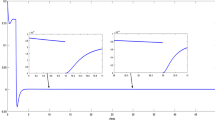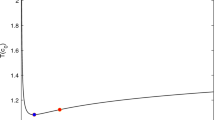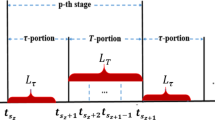Abstract
In this paper, an event-triggered extended dissipative control problem for networked singular systems is investigated, where the extended dissipativity analysis unifies the H∞ performance, L2 − L∞ performance, passivity, (Q, S, R)-dissipativity in one framework. Under the event-triggered scheme, the closed-loop system is modeled as a time-delay system. Some sufficient conditions for extended dissipativity are developed and presented in terms of linear matrix inequalities (LMIs). Then the design of the state feedback controller becomes a matter of solving a set of LMIs. Finally, a numerical example is provided to illustrate the effectiveness of the proposed method.
Similar content being viewed by others
References
L. Y. Dai, Singular Control Systems, Springer-Verlag, 1989.
F. J. Bejarano, “Functional unknown input reconstruction of descriptor systems: Application to fault detection,” Automatica, vol. 57, pp. 145–151, 2015.
J. Zhou, Y. Lv, B. Pang, and C. P. Xue, “ℌ∞ filtering for a class of singular time-delay systems,” International Journal of Control, Automation and Systems, vol. 17, pp. 3131–3139, 2019.
Z. Feng and J. Lam, “On reachable set estimation of singular systems,” Automatica, vol. 52, pp. 146–153, 2015.
Z. Wu and W. Zhou, “Delay-dependent robust ℌ∞ control for uncertain singular time-delay systems,” IET Control Theory and Applications, vol. 1, pp. 1234–1241, 2007.
X. M. Zhang, Q. L. Han, and X. Yu, “Survey on recent advances in networked control systems,” IEEE Transactions on Industrial Informatics, vol. 12, no. 5, pp. 1740–1752, 2015.
T. Li, Z. Li, L. Zhang, and S. Fei, “Improved approaches on adaptive event-triggered output feedback control of networked control systems,” Journal of the Franklin Institute, vol. 355, no. 5, pp. 2515–2535, 2018.
Y. L. Wang and Q. L. Han, “Network-based modelling and dynamic output feedback control for unmanned marine vehicles in network environments,” Automatica, vol. 91, pp. 43–53, 2018.
J. Alcaina, A. Cuenca, J. Salt, V. Casanova, and R. Pizá, “Delay-independent dual-rate PID controller for a packet-based networked control system,” Information Sciences, vol. 484, pp. 27–43, 2019.
S. Linsenmayer, D. V. Dimarogonas, and F. Allgöwer, “Periodic event-triggered control for networked control systems based on non-monotonic Lyapunov functions,” Automatica, vol. 106, pp. 35–46, 2019.
Y. P. Wu and Y. Wu, “Linear matrix inequality approach to stochastic stabilization of networked control system with Markovian jumping parameters,” International Journal of Control, Automation and Systems, vol. 17, pp. 405–414, 2019.
M. Bahreini and J. Zarei, “Robust finite-time fault-tolerant control for networked control systems with random delays: A Markovian jump system approach,” Nonlinear Analysis: Hybrid Systems, vol. 36, 100873, 2020.
D. X. Liao, S. M. Zhong, J. N. Luo, X. J. Zhang, Y. B. Yu, and Q. S. Zhong, “Improved delay-dependent stability criteria for networked control system with two additive input delays,” International Journal of Control, Automation and Systems, vol. 17, pp. 1–9, 2019.
H. J. Liang, X. Y. Guo, Y. N. Pan, and T. W. Huang, “Event-triggered fuzzy bipartite tracking control for network systems based on distributed reduced-order observers,” IEEE Transactions on Fuzzy Systems, 2020. DOI: https://doi.org/10.1109/TFUZZ.2020.2982618
G. M. Zhuang, J. W. Xia, J. L. Zhao, and H. Zhang, “Non-fragile ℌ∞ output tracking control for uncertain singular Markovian jump delay systems with network-induced delays and data packet dropouts,” Complexity, vol. 21, pp. 396–411, 2016.
Y. H. Liu, H. M. Zhi, J. M. Wei, X. L. Zhu, and Q. X. Zhu, “Event-triggered control for linear continuous switched singular systems,” Applied Mathematics and Computation, vol. 374, 125038, 2020.
R. Sakthivel, S. Santra, and B. Kaviarasan, “Resilient sampled-data control design for singular networked systems with random missing data,” Journal of the Franklin Institute, vol. 355, pp. 1040–1072, 2018.
R. Sakthivel, M. Rathika, B. Kaviarasan, and H. Shen, “Stabilization criteria for singular fuzzy systems with random delay and mixed actuator failures,” Asian Journal of Control, vol. 20, pp. 829–838, 2018.
W. Sun, Q. Y. Li, C. J. Chao, and S. K. Nguang, “Mode-dependent dynamic output feedback ℌ∞ control of networked systems with Markovian jump delay via generalized integral inequalities,” Information Sciences, vol. 520, pp. 105–116, 2020.
F. Q. Li, L. S. Gao, and B. Z. Zheng, “Dual-side event-triggered output feedback ℌ∞ control for NCSs with communication delays,” International Journal of Control, Automation and Systems, vol. 16, pp. 108–119, 2018.
H. Yan, S. Yan, H. Zhang, and H. Shi, “L∞ control design of event-triggered networked control systems with quantizations,” Journal of the Franklin Institute, vol. 352, no. 1, pp. 332–345, 2015.
L. Fu and Y. C. Ma, “Passive control for singular time-delay system with actuator saturation,” Applied Mathematics and Computation, vol. 289, pp. 181–193, 2016.
J. Wang, X. M. Zhang, Y. Lin, X. Ge, and Q. L. Han, “Event-triggered dissipative control for networked stochastic systems under non-uniform sampling,” Information Sciences, vol. 447, pp. 216–228, 2018.
J. W. Xia, G. L. Chen, and J. H. Park, “Dissipativity-based sampled-data control for fuzzy switched Markovian jump systems,” IEEE Transactions on Fuzzy Systems, 2020. DOI:https://doi.org/10.1109/TFUZZ.2020.2970856
X. Y. Liang, J. W. Xia, G. L. Chen, H. S. Zhang, and Z. Wang, “Dissipativity-based sampled-data control for fuzzy Markovian jump systems,” Applied Mathematics and Computation, vol. 361, pp. 552–564, 2019.
B. Y. Zhang, W. X. Zheng, and S. Xu, “Filtering of Markovian jump delay systems based on a new performance index,” IEEE Trans Syst Regul Pap, vol. 60, no. 5, pp. 1250–1263, 2013.
S. L. Dong, M. Fang, and S. M. Chen, “Extended dissipativity asynchronous static output feedback control of Markov jump systems,” Information Sciences, vol. 514, pp. 275–287, 2020.
H. Gao, J. W. Xia, and G. M. Zhuang, “Robust finite-time extended dissipative control for a class of uncertain switched delay systems,” International Journal of Control, Automation and Systems, vol. 16, pp. 1459–1468, 2019.
X. Wang, X. Z. Liu, K. She, S. M. Zhong, and Q. S. Zhong, “Extended dissipative memory sampled-data synchronization control of complex networks with communication delays,” Neurocomputing, vol. 347, pp. 1–12, 2019.
W. Q. Xie, H. Zhu, S. M. Zhong, J. Chen, and K. B. Shi, “Extended dissipative resilient estimator design for discrete-time switched neural networks with unreliable links,” Nonlinear Analysis: Hybrid Systems, vol. 32, pp. 19–36, 2019.
N. Gnaneswaran, Y. H. Joo, and H. S. Kim, “A linear matrix inequality-based extended dissipativity criteria for linear systems with additive time-varying delays,” IFAC Journal of Systems and Control, vol. 10, 100070, 2020.
J. Lunze and D. Lehmann, “A state-feedback approach to event-based control,” Automatica, vol. 46, no. 1, pp. 211–215, 2010.
K. B. Shi, X. Z. Liu, Y. Y. Tang, H. Zhu, and S. M. Zhong, “Some novel approaches on state estimation of delayed neural networks,” Information Sciences, vol. 372, pp. 313–331, 2016.
K. B. Shi, J. Wang, Y. Y. Tang, and S. M. Zhong, “Reliable asynchronous sampled-data filtering of T-S fuzzy uncertain delayed neural networks with stochastic switched topologies,” Fuzzy Sets and Systems, vol. 381, pp. 1–25, 2020.
K. B. Shi, J. Wang, S. M. Zhong, Y. Y. Tang, and J. Cheng, “Hybrid-driven finite-time ℌ∞ sampling synchronization control for coupling memory complex networks with stochastic cyber attacks,” IEEE Transactions on Automatic Control, vol. 387, pp. 241–254, 2020.
H. J. Liang, L. C. Zhang, Y. H. Sun, and T. W. Huang, “Containment control of semi-Markovian multi-agent systems with switching topologies,” IEEE Transactions on Systems, Man and Cybernetics: Systems, 2019. DOI: https://doi.org/10.1109/TSMC.2019.2946248
D. Yue, E. Tian, and Q. L. Han, “A delay system method for designing event-triggered controllers of networked control systems,” IEEE Transactions on Automatic Control, vol. 58, no. 2, pp. 475–481, 2013.
S. Hu, D. Yue, X. P. Xie, and Z. P. Du, “Event-triggered ℌ∞ stabilization for networked stochastic systems with multiplicative noise and network-induced delays,” Information Sciences, vol. 299, pp. 178–197, 2015.
H. Wang, Y. J. Ying, R. Q. Lu, and A. K. Xue, “Network-based ℌ∞ control for singular systems with event-triggered sampling scheme,” Information Sciences An International Journal, vol. 329, pp. 540–551, 2016.
R. Sakthivel, S. Santra, B. Kaviarasan, and K. Venkatanareshbabu, “Dissipative analysis for network-based singular systems with non-fragile controller and event-triggered sampling scheme,” Journal of the Franklin Institute, vol. 354, no. 12, pp. 4739–4761, 2017.
S. Xu and J. Lam, Robust Control and Filtering of Singular Systems, Springer, 2006.
D. Yue, E. Tian, Y. Zhang, and C. Peng, “Delay-distribution-dependent stability and stabilization of T-S fuzzy systems with probabilistic interval delay,” IEEE Trans. Syst. Man. Cybern. B: Cybern., vol. 39, no. 2, pp. 503–516, 2009.
E. Fridman, “A refined input delay approach to sampleddata control,” Automatica, vol. 46, no. 2, pp. 421–427, 2010.
Author information
Authors and Affiliations
Corresponding author
Additional information
Publisher’s Note
Springer Nature remains neutral with regard to jurisdictional claims in published maps and institutional affiliations.
Recommended by Associate Editor Ohmin Kwon under the direction of Editor Jessie (Ju H.) Park.
This work was supported by the National Natural Science Foundation of China under Grants 61973148, 61773191,Natural Science Foundation of Shandong Province under Grant ZR2018MF028.
Meiyu Li received her B.S. degree in mathematics and applied mathematics from Dezhou University, Dezhou, China, in 2016. She is currently a graduate student of School of Mathematical Sciences, Liaocheng University. Her current research interests include Networked control systems, event-triggered control, etc.
Jianwei Xia is a professor of the School of Mathematics Science, Liaocheng University. He received a Ph.D. degree in automatic control from Nanjing University of Science and Technology in 2007. From 2010 to 2012, he worked as a Postdoctoral Research Associate in the School of Automation, Southeast University, Nanjing, China. From 2013 to 2014, he worked as a Postdoctoral Research Associate in the Department of Electrical Engineering, Yeungnam University, Kyongsan, Korea. His research topics are robust control, stochastic systems and neural networks.
Junsheng Zhao received his B.S. degree in mathematics from Liaocheng University in 2003, an M.S. in mathematics from Qufu Normal University and a D.E. in the School of Automation, Southeast Univer sity in 2015. Since 2006, he has been with Liaocheng University, China, where he is currently an associate Professor. His current research interests include stochastic control and neural networks.
Huasheng Zhang is an Associate Professor of the School of Mathematics Science, Liaocheng University. He received an M.Sc. degree from Shandong Normal University, China, in 2006, and received a Ph.D. degree in automatic control from Shanghai University in 2009. His current research interests include robust control and filtering, time-delay systems, stochastic systems and neural networks.
Hao Shen received his Ph.D. degree in control theory and control engineering from Nanjing University of Science and Technology, Nanjing, China, in 2011. From February 2013 to March 2014, he was a Post-Doctoral Fellow with the Department of Electrical Engineering, Yeungnam University, Korea. Since 2011, he has been with Anhui University of Technology, China, where he is currently a Professor and a Doctoral Supervisor. His current research interests include stochastic hybrid systems, complex networks, fuzzy systems and control, nonlinear control. Dr. Shen has served on the technical program committee for several international conferences. He is an Associate Editor/Guest Editor for several international journals, including IEEE ACCES, Journal of The Franklin Institute, Applied Mathematics and Computation, Transactions of the Institute Measurement and Control and Mathematical Problems in Engineering. Prof. Shen was a recipient of the Highly Cited Researcher Award by Clarivate Analytics (formerly, Thomson Reuters) in 2019.
Rights and permissions
About this article
Cite this article
Li, M., Xia, J., Zhao, J. et al. Event-triggered Extended Dissipative Control for Networked Singular Systems. Int. J. Control Autom. Syst. 19, 382–391 (2021). https://doi.org/10.1007/s12555-020-0140-3
Received:
Revised:
Accepted:
Published:
Issue Date:
DOI: https://doi.org/10.1007/s12555-020-0140-3




